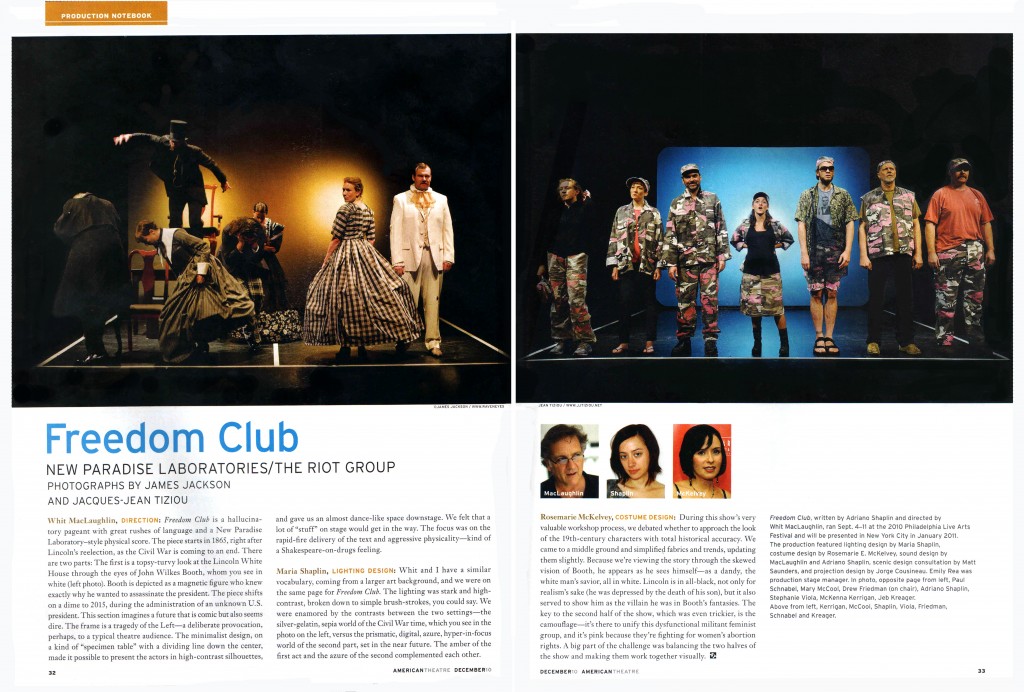What I Gained From Punk: Maria Shaplin – Lighting Designer

Maria Shaplin never thought lighting design could be a career. Maria and Kai talk about being part of the punk movement and what she gained from it (6:50), what made her stay in theatre after a humiliating moment (8:40), and the concept of selling ourselves in the performing arts (16:15). They also discuss privilege and realizing class consciousness as a child (33:30) and the hilarious and unfortunate events surrounding a prop dynamite (54:40).
FringeArts Blog: Talkin’ Lights with Maria Shaplin
“I think I’m an anxious and dissatisfied artist, and one of the reasons I love theater is that after a few weeks we get to tear it all down and start from scratch again… I enjoy a passionate director, even if they have conflicting ideas or are difficult. If they are doing really cool work, conceptual, risky, or stylistically experimental work, I will put up with a lot. Or directors that use evocative language to describe what they want, and leave the logistical choices up to me.” -FringeArts Blog April 13th, 2013
American Theatre Magazine
Philadelphia Magazine: Philly Police Freak Out Over Theater Company’s Bomb Prop
“The bomb squad supposedly said it was the most realistic fake bomb they had ever seen,” says Applied Mechanics member Thomas Choinacky, crediting company designer Maria Shaplin’s handiwork. “We Are Bandits was bringing the ideas of alternative economies and thinking outside of the capitalist model. Tickets were free for all audience members. It is entertaining to me that in the striking of the show, this occurred. This is great feminist theater at work!” -Philadelphia Magazine Aug 2, 2014
Applied Mechanics’ Some Other Mettle
“Over the last five years, Applied Mechanics has gone from DIY to one of the most polished theater groups in Philadelphia, thanks in large measure to designer Maria Shaplin’s ingenious visual concepts.” -Metro September 6th, 2012
Lucidity Suitcase Intercontinental’s 17 Border Crossings
“The set design along with Maria Shaplin’s well crafted lighting allows Phillips to continually re-invent the space, it’s a row of train compartments, it’s a ferry from Italy to Croatia, it’s an American Customs Declaration queue, but it’s always a line in the sand, chalked onto the ground by people in an effort to transform geography into something we can control, an artificial boundary that says this space isn’t like that other space because if we aren’t us and them then what can we possibly be?” -Staged Blog April 5th, 2011
Applied Mechanics’ Overseers
“Maria Shaplin’s design contributes mightily to Overseers’ unified otherworldliness: The cast wear cultish cream-colored raw linen jumpers; Mary Tuomanen’s scientist sports elongated fingers and bustles with the no-nonsense, head-down demeanor of a woodland creature, analyzing slides from atop a wooden perch…” The Philadelphia Inquirer September 5th, 2011
Swim Pony’s Survive!
“Swim Pony’s attention to detail in the set, Maria Shaplin’s lighting and Mikaal Sulaiman’s sound reminded me of the golden age of science fiction movies, when the designers of Star Wars shaped each landscape by hand, used puppets to feign alien life, and evoked a greater realism than the computer-generated world of Avatar.” -Broad Street Review April 15th, 2010
NPL and The Riot Group’s Freedom Club
“Rosemarie E. McKelvey’s costumes throughout are both clever and handsome, while Matt Saunders’ minimal set design — an ornate wooden chair set on a platform — combined with Maria Shaplin’s self-consciously dramatic lighting, make the show a visual pleasure.” Variety Sept 6th, 2010
“A maddening orgiastic excitement escalates right up to the assassination; then the action freezes on the gunshot, Maria Shaplin’s night club lighting fades into a slow burn, and the action flies forward to 2015, where it suddenly and inexplicably becomes boring without the redeeming virtue of ridiculousness.” -The Broad Street Review Spetember 4th, 2010

